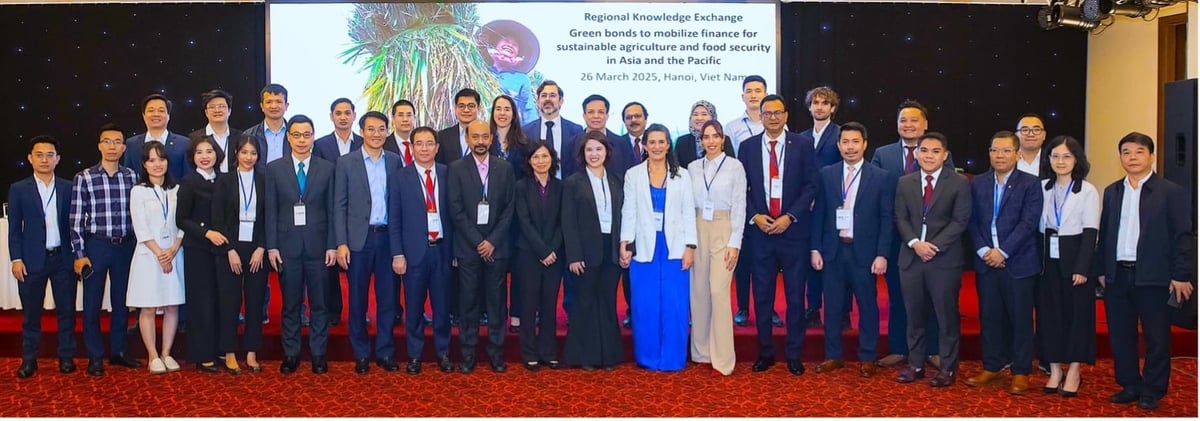May 21, 2025 | 12:58 GMT +7
May 21, 2025 | 12:58 GMT +7
Hotline: 0913.378.918
May 21, 2025 | 12:58 GMT +7
Hotline: 0913.378.918

Agricultural policymakers, development banks, and climate finance leaders from across Asia and the Pacific gathered in Hanoi this week for a high-level Regional Knowledge Exchange. Photo: EEA/EFTA.
Smallholder farmers and agricultural small and medium enterprises (agri-SMEs) – key actors in food production – continue to face barriers in accessing capital for climate-smart transitions. Stakeholders across the region are increasingly recognizing that green bonds offer a powerful, yet underexploited, solution to mobilize investments for low-emission, resilient agri-food systems.
“In the push to transform agriculture in the region, financial innovation is essential,” said Mr. Bui Duc Hieu, Deputy Director General of the International Cooperation Department at Viet Nam’s Ministry of Agriculture and Environment. “We must collaborate across countries, institutions and financial sectors to scale up investment in sustainable agriculture. Green bonds can be a game changer in supporting smallholders and agri-enterprises to transition toward low-emission, climate-smart farming.”
The exchange highlighted case studies in Thailand, India, Malaysia, Bangladesh, the Philippines, and Vietnam, offering insights into successful green and thematic bond issuances to mobilize finance for sustainable agriculture. Delegates also explored lessons from international partners such as the World Bank Treasury and Asia-Pacific Rural and Agricultural Credit Association, and discussed new Agriculture Criteria developed by the Climate Bonds Initiative to accelerate investment in sustainable, resilient agri-food systems.
Dr. Pham Quang Minh, Head of Food, Agriculture and Forestry at the ASEAN Secretariat, emphasized the importance of region-wide coordination: “This regional collaboration marks a pivotal moment in shaping an ASEAN-wide approach to decarbonizing agriculture through green finance.”
New frameworks, such as the Agriculture Criteria developed by the Climate Bonds Initiative, are beginning to offer clearer pathways for aligning green bond instruments with both sustainability objectives and investor expectations. This alignment is critical for attracting public and private investment at the scale needed to drive transformation.

Agricultural policymakers, development banks, and climate finance leaders from across Asia and the Pacific gathered in Hanoi for a high-level Regional Knowledge Exchange to accelerate the use of green bonds.
FAO’s Natural Resources Officer for the Asia-Pacific, Mr. Beau Damen, noted the urgency of channeling climate finance toward agriculture, which has long been overlooked in green finance flows: “As the tracking of climate finance data improves, it has become clear that it is not reaching the agriculture sectors and smallholder farmers in particular. This workshop has highlighted strong consensus that green bonds are an important, but underutilized vehicle for the public sector to drive investment in climate resilient and low emission agriculture with wider benefits for farming communities and food security. FAO is committed to working with partners in government and the finance community to unlock their transformative potential.”
Momentum is now building for the creation of an ASEAN Green Bond for Decarbonizing Agriculture—a regional initiative aimed at coordinating green bond mechanisms across member states in line with ASEAN’s Green Bond Standards, Sustainable Finance Taxonomy, and collective food security goals. As the region grapples with increasing climate risks and food insecurity, green bonds could offer a critical instrument to reshape its agricultural future.
Agricultural policymakers, development banks, and climate finance leaders from across Asia and the Pacific gathered in Hanoi this week for a high-level Regional Knowledge Exchange to accelerate the use of green bonds as a tool for financing sustainable, climate-resilient agriculture and food systems.
Hosted by the Food and Agriculture Organization of the United Nations (FAO) with support from the Ministry of Agriculture and Environment (MAE) of Vietnam and in collaboration with the Climate Bonds Initiative, the exchange convened delegates from ASEAN member states and beyond to share lessons from national green bond experiences and co-develop pathways to unlock finance for smallholder farmers and agri-SMEs.

(VAN) In 2024, over 295 million people across 53 countries and territories faced acute hunger—an increase of almost 14 million people compared to 2023, while the number of people facing catastrophic levels of hunger reached a record high.

(VAN) World Environment Day 2025 (June 5) carries the theme 'Beat Plastic Pollution' continuing to emphasize the global urgency of addressing the plastic waste crisis.

(VAN) This was the assessment shared by experts at the workshop titled 'Assessing the Role and Potential of Low-Emission Rice Production Systems in Vietnam,' held on the morning of May 19.

(VAN) Cai Rong Port is the fisheries control center of Quang Ninh, helping to monitor fishing vessels, combat IUU fishing, and remove the EC's 'yellow card'.

(VAN) The German Agricultural Society (DLG) explores the possibility of establishing a mechanization service center in Vietnam’s Mekong Delta to support farmers in accessing and utilizing advanced machinery.

(VAN) On May 16, the Department of Water Resources Management, in collaboration with the Food and Agriculture Organization of the United Nations (FAO), held a signing ceremony for the GEF-8 project document.

(VAN) Food safety, mechanization, vocational training, and market opening are key areas of cooperation expected between the Vietnamese Government and the Federal Republic of Germany.